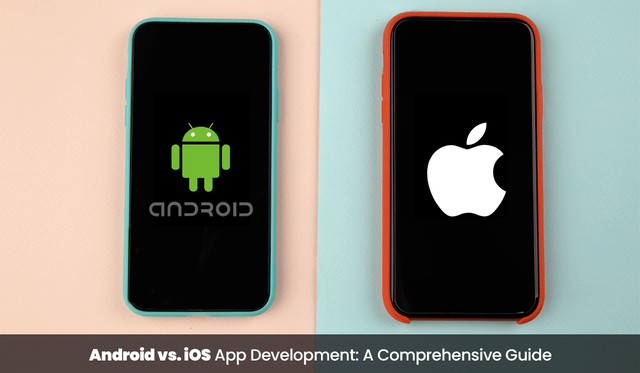The mobile market is growing rapidly and increasingly competitive, with more people turning to their phones for everything from entertainment to shopping. Android and iOS are two of the most popular operating systems in today's mobile world.
A variety of devices from different manufacturers use Android, which Google develops. Apple's iOS software is only available on Apple devices.

For any brand or business looking to build an app, it's essential to recognize the differences between Android and iOS app development. This comprehensive guide will detail each platform's development details, costs, benefits, and limitations. It will help everyone, from web developers to IT experts, brand owners and bloggers, marketers, and even the average user, make an informed decision about the best platform for their project.
Android vs. iOS: Comparing the Major Differences in Developing
Regarding Android vs. iOS app development, there are a few significant differences.
Native Coding Languages
Perhaps the most critical Difference is the native coding languages used for each platform.iOS uses Swift or Objective-C as its primary programming language, while Android uses Java (and Kotlin). In some cases, programming languages like C, C++, and Basic are also used (4).
App Development Process
Another key difference is the overall app development process. With Android, creating a basic app with limited functionality is generally more accessible. However, adding more advanced features and functionality can take more work. With iOS, it is often easier to add advanced features and functionality, but creating a basic app can be more challenging.
Android apps are also typically designed using a more "open" approach, giving mobile application developers more freedom to customize their apps as they see fit. iOS apps tend to be more restricted in terms of design and functionality.
App Approvals
Another critical difference between the two platforms is how they handle app approvals and distribution. Google Play does not require consent for Android apps before they are published. However, all iOS apps must be submitted to Apple for review before being published on the App Store. This review process can take several days or even weeks in some cases.
App Distribution And Monetization
Finally, there are also some differences in app distribution and monetization. With Android, there are several ways to distribute and monetize your app. However, with iOS, your options are more limited when distributing and monetizing your app.

Android vs. iOS: The Pros & Cons
several factors to consider when you decide whether to develop a native app for each platform or build a cross-platform app. Some developers choose one platform over the other, while others set for both. Here, we'll outline the pros and cons of developing each platform so you can decide which is suitable for your app.
Android Pros
Open source platform that is constantly evolving
More affordable to develop for
Can reach a larger audience due to the global market share of Android devices
** Android Cons**
Models and OS vary widely, making providing a consistent user experience across devices more challenging.
Releasing an app on the Google Play Store can be lengthy and complex.
** iOS Pros**
The walled garden approach leads to fewer security risks
Consistent user experience across devices
Apple users are generally more affluent than Android users, meaning they're more likely to spend money on in-app purchases and subscriptions.
** iOS Cons**
More expensive to develop due to the need for Apple hardware and software
Overall, there are pros and cons to both Android and iOS app development. It's essential to choose the platform that's right for your specific project and goals.
Android vs. iOS: Which Platform is Right for Your Business
Several factors to consider when deciding whether to develop for Android or iOS for your digital business. Here are some key considerations:
Market share:
Android currently holds a larger market share than iOS globally, though iOS dominates in developed markets like the US. As per May 2022 statistics, Android accounts for 43.23% of the overall market share, while as per May 2022, Apple's iOS mobile operating system held around 17.2 percent of the global smartphone market share in the third quarter of 2022, down from the previous quarter (1,2). If your target market is global, Android may be the better choice. If you're targeting developed markets, iOS may be a better bet.
Development cost:
Generally speaking, developing for Android is less expensive than iOS due to the lower barriers to entry (e.g., no need to pay for Apple's developer fee). Building an iOS app will cost around$15,000 – $450,000 (3). However, this could change as Apple continues to expand its reach and lower costs.
Time to market:
The fragmented nature of the Android platform can often make it more time-consuming to develop, e.g. different device sizes, OS versions, etc. It is something to consider if you're looking to get your app to market quickly.
Monetization:
There are typically more opportunities for monetization on iOS due to the higher average income of iPhone users. There are still plenty of successful ways to monetize Android apps.
Ultimately, there's no right or wrong answer when choosing between Android and iOS app development. It depends on your specific needs and goals. Hopefully, this guide has given you some food for thought in making your decision.
Conclusion:
The decision between Android and iOS app development involves many factors. It depends on your specific needs and goals as a business. If you need a fast turnaround time and low development costs, then Android is the best platform for you. If you're looking for a high-quality user experience and greater control over the look and feel of your app, then iOS is the way to go.
Ultimately, the decision comes down to what's most important to your business. By weighing all the pros and cons, you can make the best decision for your company between Android and iOS app development.